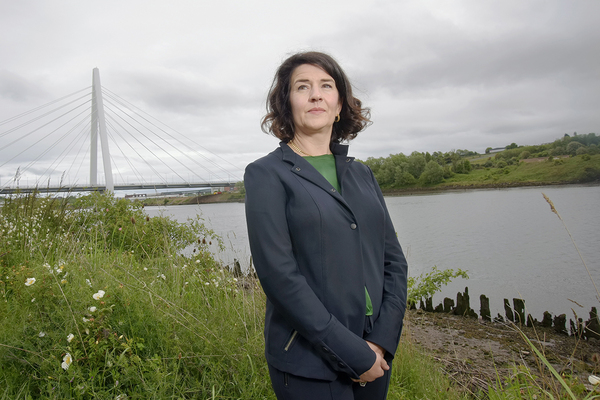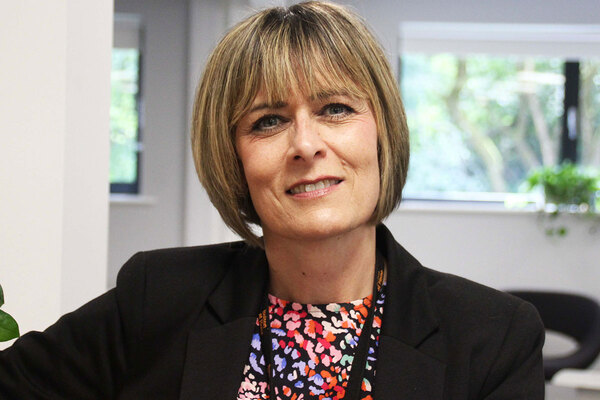You are viewing 1 of your 1 free articles
The Northern housing sector is ready to lead the fight against climate change
It’s time for the North to lead in generating the ideas and action to support housing innovation that will benefit our ecosystems, people and economy, writes Tracy Harrison
The North has always had the ability to solve difficult problems through innovation and ingenuity. From the world’s first railways to the discovery of graphene, our region has a proud history of being resourceful, clever and thoughtful to solve problems and generate new ideas.
There’s nowhere that kind of innovation is needed more than in the fight against climate change. The release of carbon dioxide into our atmosphere over countless decades has created a heat-trapping blanket that is warming our atmosphere and disrupting the delicate balance that keeps our climate stable.
Here, too, the North is on the frontline: 55 of our councils and combined authorities (and counting) have now declared climate emergencies. And rightly so – the recent floods across the North of England have provided one example of the devastating impact climate change can have on our communities.
The councils that have declared an emergency have a range of political perspectives. That reflects the fact that this is an issue that transcends politics. There are disagreements about how quickly we adapt – should we aim for 2050, 2038 or 2030? But there is welcome unanimity on the destination: we are all on a journey to a zero-carbon Britain – a journey which will likely accelerate as the UN Global Climate Summit in Glasgow next November draws near.
While the issue is global, and some of the commitments are national, the innovation and solutions will be local and regional, reflecting local differences in the source of carbon emissions.
And it is here that improving the North’s existing housing has such a vital role to play.
Across the Liverpool City Region, for example, it is estimated that heat-trapping carbon emissions from housing account for some one third of the area’s total; rising to 40% in some districts, much higher than the national average of around 15%.
The North’s older housing stock – with one in five of our homes built pre-1919 and two in five before 1944 – means that we face more significant challenges in phasing out old technologies that contribute to climate change.
Making our homes fit for the future won’t be easy and it won’t be cheap. The Committee on Climate Change has estimated the cost of bringing an existing home up to the standards achievable in new build at more than £41,000. These costs will likely be prohibitive in many cases; but even aiming for the lower standard code level ‘C’ recommended by the Business, Energy and Industrial Strategy Committee in the Energy efficiency: building towards net zero report in July is going to prove extremely challenging in the North.
Tony Stacey, chief executive of South Yorkshire Housing Association, wrote on these pages recently about the cost of bringing social housing stock up to code level C and the difficult choices housing associations face between retrofitting existing homes and building new ones.
Mr Stacey’s point is particularly significant because the social housing stock starts from a higher base: much is already of a significantly higher standard than some of the North’s owner-occupied and privately rented stock.
We have parts of the North where terraced houses are changing hands for £20,000 and areas where the bottom end of the private rented sector is spiralling. That brings a bill of tens of thousands to retrofit them into stark relief.
We need to start facing up to the difficult questions this will raise: does it really offer good value for money when the homes would still lack modern space standards inside and out? What are the other housing renewal options localities will need to consider to deliver both carbon neutrality and homes fit for modern living? How do we work with private landlords on this agenda?
“We think it’s time for the North to lead in generating the ideas and action to support housing innovation that will benefit our ecosystems, our people and our economy”
So tackling climate change won’t just mean phasing out old technologies. In some communities, it will mean phasing out old buildings. We need to view climate change as an opportunity to innovate, to renew our homes in a range of ways: improving their sustainability and resilience, making them affordable to heat, and making them fit for the needs of our future (and ageing) population. That will have knock-on benefits for our health and for our local economies – by creating the green jobs of the future.
The North’s role in the ‘Green Industrial Revolution’ was recognised in the first manifesto for the North produced by our 11 local enterprise partnerships this autumn. And it’s why last month the Northern Housing Consortium’s (NHC) board agreed to develop a programme of work on decarbonisation.
The NHC team is now stepping up engagement with our council, housing association and ALMO members at all levels to understand their priorities, as well as the resources and policy changes we need to make large-scale, carbon-focused renewal of the North’s housing stock a reality.
We don’t have all the answers – which is why we want to start a conversation with members and partners. Put simply, we think it’s time for the North to lead in generating the ideas and action to support housing innovation that will benefit our ecosystems, our people and our economy.
Tracy Harrison, chief executive, Northern Housing Consortium














